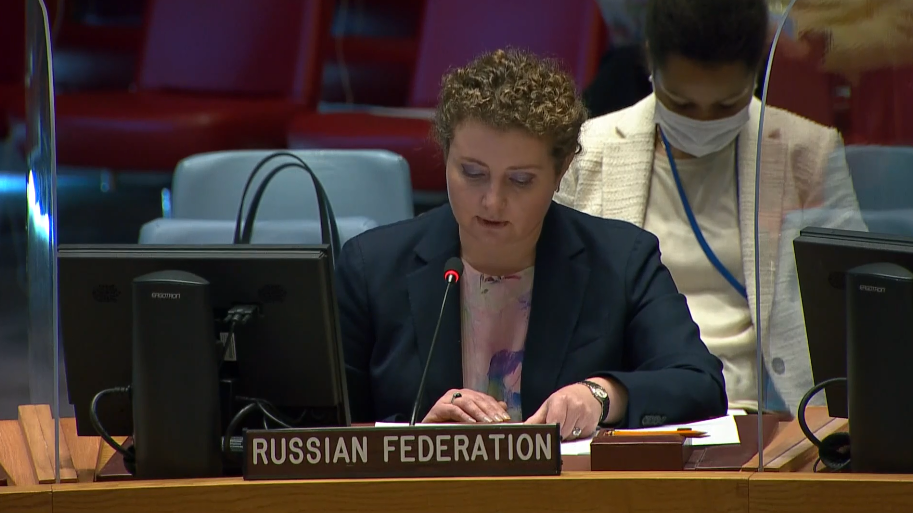Statement by Deputy Permanent Representative Anna Evstigneeva at UNSC briefing on UN police commissioners
Mme.President,
We thank USG Jean-Pierre Lacroix, UN Interim Security Force for Abyei Police Commissioner Violet Lusala and UN Multidimensional Integrated Stabilization Mission in Mali Police Commissioner Patricia Boughani for their useful briefings. Through the commanders, we would like to thank all those under them for conscientiously carrying out their duties to support peace and security in difficult conflict situations.
We view police components as an integral part of the UN peacekeeping operations. They make their contribution into the implementation of unique mandates for every mission which are determined by specific situations in countries of deployment. This, in particular, is true for the UN peacekeeping operations that our briefers represent today. The goals of the UN operations in Abyei and Mali differ significantly, but there is work for the Blue Berets in both regions.
The majority of peacekeeping missions are deployed in countries where there is a significant weakening or even total absence of national law enforcement bodies. In such circumstances, crime problems multiply, including organized crime, human trafficking, drug trafficking, sexual violence and violence against children. Therefore, UN police, which are better trained for such circumstances, can make a significant contribution to the important goal of protecting civilians from direct security threats and can also provide temporary assistance to national law enforcement agencies or even replace them. At the same time, it is important to avoid such situations when long-term presence of UN missions essentially leads to a long-term replacement of the local police by the UN.
Impartial implementation of its mandate by the UN police has great significance, as well as knowledge of political aspects of conflicts and close cooperation with local authorities and population. Any potential mistakes can prove costly both for the peacekeepers and the peace process. Sometimes one cannot avoid an in-depth explanation of the mandate in order to win the trust of the local population and also to prevent them from having unrealistic or wrong expectations.
It is important to take into consideration potential ethnic, religious or any other issues as well as national specificities of the people living in the area of mission deployment. Moreover, the majority of people who are most in need are women and children and they require a special approach. That is why the ranks of UN police should include both male and female officers. We are convinced that the top priority here should be not to achieve any percentage-based gender indicators, but rather to ensure effective implementation of the tasks under the mandate and assessment of deployment and security situations. Moreover, when women are part of the UN peacekeeping operations, including female commanders, the broad geographical distribution principle should be strictly observed.
Another important task that is being successfully carried out by the Blue Berets is assisting in post-conflict reform of law enforcement institutions and building the national capacity of the host states. We are talking about sharing experience, establishing work and training staff. The more effective this work is, the faster the responsibility for maintaining law and order can be fully transferred to national forces. Undoubtedly, UN police must be professionally trained and supplied with necessary equipment. They should be also highly motivated to train others.
In this regard, we support the work of the UN Secretariat that is already underway and the work of many regional organizations, first and foremost, the AU to improve the training of police peacekeepers.
Russia is making an active contribution into our shared work. Over more than the past 20 years, the UN-certified All-Russian Peacekeepers Training Center of the Ministry of Internal Affairs in Domodedovo has trained hundreds of foreign police peacekeepers, including commanders, from more than 50 countries of the world and primarily from African countries. There are many women among them. Russia has unique experience in the area of vocational training of peacekeepers that we are prepared to share. Hundreds of Blue Berets from Russia have also made their contribution to supporting peace and security around the world. Today, about 40 Russian officers are serving in different UN missions and more than one-third of them are women. Using this opportunity, I would like to congratulate them on Police Day that is celebrated today, 10 November, in Russia.
We are convinced that the police component of peacekeeping warrants particular attention of the UN Member States both within the UNSC when we are talking about individual country situations and in the UNGA. We believe that the best platform for discussing general police matters is the UNSC Working Group on Peacekeeping and the UNGA Special Committee on PKOs where all PCCs are represented and whose mandate is the comprehensive consideration of matters pertaining to peacekeeping.
Thank you for your attention.
